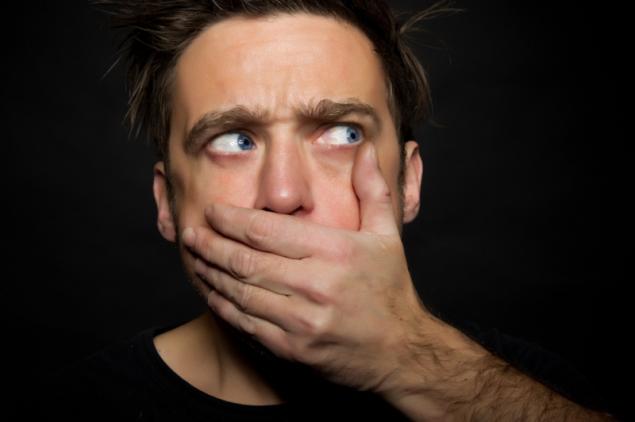399
As swear words are connected with our emotions
Words can be represented as a set of spoken sounds or written letters — by themselves they do not possess an internal force that can influence us in emotional impact. But if you remember the insults or the worst swear words that exist in our language, we understand that things are not so simple — our reaction to some of the words immediate and clearly emotionally charged. As words from the field of linguistics are moved to the field of psychology?
The study, published by Professor Timothy Jay, a psychologist and expert on abuse, was aimed at the study of child abusive lexicon — his experiments have shown that boys and girls aged one to two years can use up to 6 and 8 swear words, respectively, ranging in age from five to six to 34, and 21 words.
The scientist insists that parents should not attempt to impede such enrichment: first, it is useless; secondly, because children learn by example of adults to cope with their emotional States. Parents should teach children the nuances of bad language — the context and situations where the use of profanity is acceptable.

In addition, the scientist insists that the ability to swear is the evolutionary advantage of man, but in our time about the positive sides of bad language does not say practically nothing. Accordingly, more research should be conducted by scientists from cognitive and psychological Sciences.
What words are perceived as "dangerous"? Another study showed that almost in all cultures of the obscene vocabulary is divided into deistic associated with religion, and visceral, associated with the body. Fear and reverence are typically expressed using the first type of profanity and disgust, shame and sexual arousal with the second. Not only profanity, but also words in General related to religious or personal context, "engage" within us with the relevant contexts of these emotions.
Why some words have such power? It turns out that for swearing in the human brain the limbic system and subcortical nucleus of the structure formed in the process of evolution before the cerebral cortex responsible for language communication at all. Therefore, people with lesions of the respective areas can not bind words into sentences, but retain the ability to reproduce curses. This ability, for example, corresponds to howl and guttural sounds of animals — expressions of pain and frustration or, on the contrary, pleasure.
Exotic examples of taboo words in the language
Linguist Robert Trask in 1975 described the case when residents of a community in the Australasian region were forced to withdraw from the language the word after the death of one of the members of the tribe — it was also his name.
The aborigines of Northern Australia, to communicate in the language of Derbal, are unable to use normal speech when communicating with relatives of the other sex — the object of the conversation, they have to be expressed metaphorically.
The native language of the Bantu living in South Africa, using a unique consonant sounds-"clicks" borrowed from neighboring peoples, to encode certain concepts — is so taboo language.published
Author: Kirill Rozhentsov
P. S. And remember, just changing your mind — together we change the world! ©
Join us in Facebook , Vkontakte, Odnoklassniki
Source: theoryandpractice.ru/posts/8882-abusive-language
The study, published by Professor Timothy Jay, a psychologist and expert on abuse, was aimed at the study of child abusive lexicon — his experiments have shown that boys and girls aged one to two years can use up to 6 and 8 swear words, respectively, ranging in age from five to six to 34, and 21 words.
The scientist insists that parents should not attempt to impede such enrichment: first, it is useless; secondly, because children learn by example of adults to cope with their emotional States. Parents should teach children the nuances of bad language — the context and situations where the use of profanity is acceptable.

In addition, the scientist insists that the ability to swear is the evolutionary advantage of man, but in our time about the positive sides of bad language does not say practically nothing. Accordingly, more research should be conducted by scientists from cognitive and psychological Sciences.
What words are perceived as "dangerous"? Another study showed that almost in all cultures of the obscene vocabulary is divided into deistic associated with religion, and visceral, associated with the body. Fear and reverence are typically expressed using the first type of profanity and disgust, shame and sexual arousal with the second. Not only profanity, but also words in General related to religious or personal context, "engage" within us with the relevant contexts of these emotions.
Why some words have such power? It turns out that for swearing in the human brain the limbic system and subcortical nucleus of the structure formed in the process of evolution before the cerebral cortex responsible for language communication at all. Therefore, people with lesions of the respective areas can not bind words into sentences, but retain the ability to reproduce curses. This ability, for example, corresponds to howl and guttural sounds of animals — expressions of pain and frustration or, on the contrary, pleasure.
Exotic examples of taboo words in the language
Linguist Robert Trask in 1975 described the case when residents of a community in the Australasian region were forced to withdraw from the language the word after the death of one of the members of the tribe — it was also his name.
The aborigines of Northern Australia, to communicate in the language of Derbal, are unable to use normal speech when communicating with relatives of the other sex — the object of the conversation, they have to be expressed metaphorically.
The native language of the Bantu living in South Africa, using a unique consonant sounds-"clicks" borrowed from neighboring peoples, to encode certain concepts — is so taboo language.published
Author: Kirill Rozhentsov
P. S. And remember, just changing your mind — together we change the world! ©
Join us in Facebook , Vkontakte, Odnoklassniki
Source: theoryandpractice.ru/posts/8882-abusive-language























